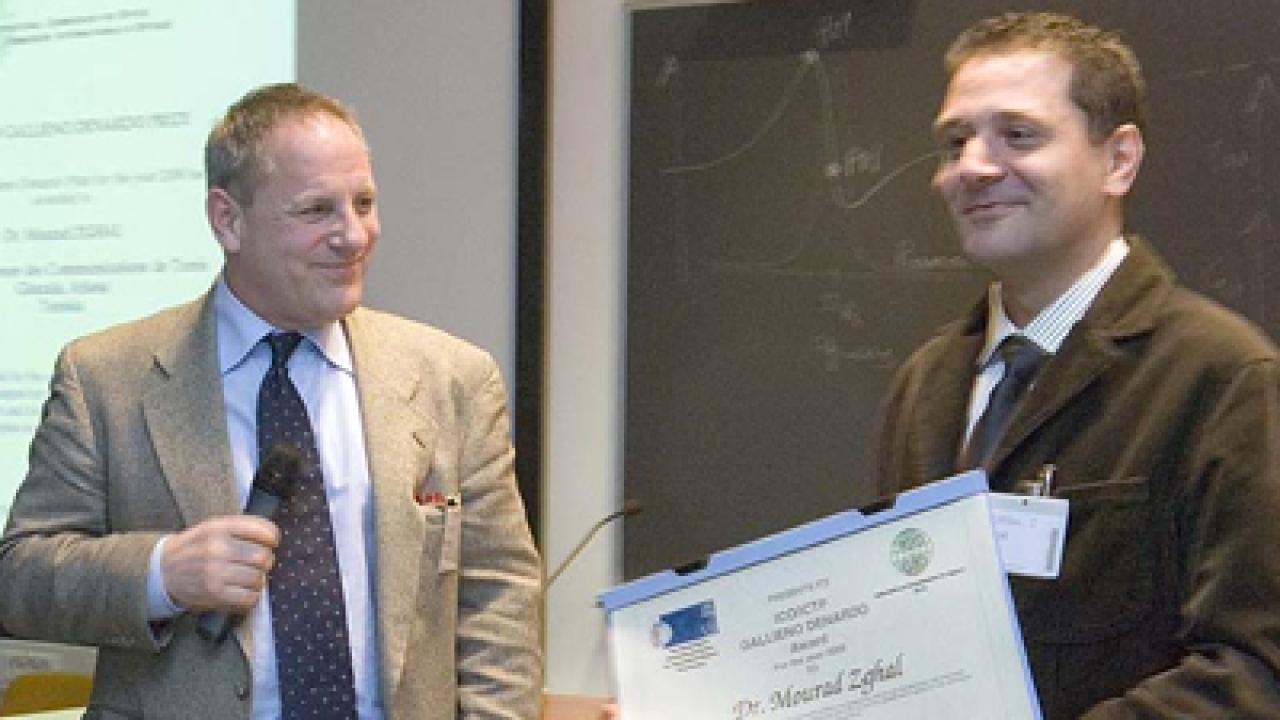
ICTP Associate Mourad Zghal has joined the ranks of the world's
most prominent optics scientists: he has been named a Fellow of SPIE, the
international society for optics and photonics. SPIE Fellows have
made significant scientific and technical contributions in optics,
photonics, optoelectronics and imaging, and have performed notable
service to the community.
The SPIE honour represents an important milestone for Zghal, who
has worked tirelessly to promote optics and photonics in his home
country, Tunisia, and broadly throughout Africa. A professor at the
Engineering School of Communication of Tunis, University of
Carthage, Zghal co-founded the Optical Society of Tunisia in 2002,
and later established student chapters of SPIE and the Optical
Society (OSA) there. He also founded the African Laser Center, an
organization based in South Africa that encourages the exchange of
researchers and students across Africa. He sees Tunisia, a country
perched on the Northern tip of Africa, as an important bridge
between the African continent and Europe, connecting scientists
from north and south.
Tunisia and its neighbouring Arab countries comprise an area of
historical importance for groundbreaking science. It was here,
during the Islamic Golden Age, that scholars developed trigonometry
and made advances in optics and astronomy.
Today Tunisia faces multiple challenges as it recovers from
political turmoil that set off a wave of unrest throughout the Arab
world. Before its 2011 revolution, Tunisia's spending on research
and development had been steadily climbing since 2000, according to
UNESCO's Science
Report, and it was the leading Arab country in
research and development efforts. Zghal feels optimistic about
science in his country in spite of the recent turmoil. The
country's approval of a new constitution has paved the way for
stability, he explains, and support for science is back on track.
"The level of scientists is good, and in most African countries the
education is not bad," he says.
Zghal humbly attributes his own success to hard work, a good
mentor, and opportunities. He obtained his degree in communication
engineering from the Engineering School of Communication in 1995,
and went on to receive an MSc and PhD degrees in electrical
engineering from the National Engineering School of Tunis in 1996
and 2000, respectively. His mentor, Zohra Ben Lakhdar, herself an
ICTP Associate and recipient of the prestigious 2005 L'Oreal-UNESCO
award for Women in Science, was a professor of his and inspired him
to pursue research in optics.
"Zohra's role in my career--and indeed in Tunisian science--has
been very important. She has created a new dynamic for the whole
African continent, and I try to follow in her footsteps," he
says.
Ben Lakhdar also became Zghal's link to ICTP, and he soon found
himself in Trieste attending his first ICTP activity, a 1997
workshop on telecommunications. Now he is a regular participant of
the Centre's annual winter colleges on optics. In 2008, Zghal won
the ICO/ICTP Gallieno
Denardo Award for his original work in the development
of numerical modeling techniques for photonic crystal fibers,
microstructured optical fibers, and polarization. The award
recognizes a researcher under 40 years of age from a developing
country who has made significant contributions to the field of
optics.
Zghal's face brightens when he talks about the opportunities
afforded to him over the years by his association with ICTP,
opportunities that are rare in Tunisia. As an ICTP Associate he is
entitled to a number of cost-free trips to the Centre, although he
admits that he has not been able to take full advantage of the
scheme because of commitments to students at his home institute. He
has carried out research at Trieste's Elettra Sincrotrone thanks to
ICTP's strong ties with that institute, and was able to extend that
opportunity to a student of his through ICTP's Sandwich
Training Education Programme.
"When researchers from developing countries arrive at ICTP there
are huge possibilities waiting for them, from meeting renowned
scientists to hearing about the latest advancements," says Zghal.
There are also helpful services, Zghal points out, such as the
Centre's electronic journal delivery service
(eJDS), which gives developing-world scientists free
access to many of the world's top science journals, easing the
isolation faced by scientists working in places that lack the
resources to support such access.
Zghal modestly suggests that scientists like him and Ben Lakhdar
can serve as examples for others in developing countries who face
similar challenges, and also as unofficial ambassadors promoting
the type of opportunities available at ICTP. If one is realistic
and hard-working, honours such as a SPIE Fellow are within one's
grasp, says Zghal, adding encouragingly, "If someone else did it,
so can you."
















